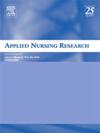Organizational change fatigue among nurses and its impact on work engagement: A qualitative study
IF 2.2
4区 医学
Q1 NURSING
引用次数: 0
Abstract
Aim
To explore how organizational change fatigue influences nurses' work engagement based on their lived experiences in tertiary hospitals in China.
Background
Organizational change fatigue undermines nurse engagement, a factor consistently linked to patient safety and workforce retention. Nurses are frequently positioned at the center of hospital reforms and must adapt to structural, technological, and policy-driven changes. These transitions often create cumulative stress, yet little is known about how nurses subjectively experience change fatigue or how it shapes their professional engagement. Addressing this gap is essential, as understanding lived experiences can inform leadership and policy strategies to sustain nurse well-being and ensure safe, high-quality patient care.
Methods
A descriptive phenomenological design was employed. Semi-structured interviews were conducted with 12 registered nurses from three tertiary hospitals using purposive sampling. Data were analyzed using Colaizzi's seven-step method, and reporting followed the Consolidated Criteria for Reporting Qualitative Research.
Results
Four themes were identified: perceptions of organizational change, emotional and behavioral responses, coping strategies and perceived support, and impact on work engagement. Nurses described a cyclical trajectory from emotional fatigue to disengagement, with the potential for re-engagement when supported by psychologically safe and inclusive environments.
Conclusions
Organizational change fatigue erodes nurses' motivation, professional commitment, and care quality. However, recovery is possible through relational leadership, transparent communication, and recognition of emotional labor. These findings highlight the need for human-centered change strategies to maintain engagement and ensure workforce sustainability during continuous healthcare reform.
护士组织变革疲劳及其对工作投入的影响:一项质的研究
目的探讨组织变革疲劳对三级医院护士工作投入的影响。组织变革疲劳会破坏护士的敬业度,而这一因素一直与患者安全和员工留任有关。护士经常被定位在医院改革的中心,必须适应结构、技术和政策驱动的变化。这些转变通常会产生累积的压力,但很少有人知道护士是如何主观地经历变化疲劳的,或者它是如何塑造他们的专业参与的。解决这一差距至关重要,因为了解生活经验可以为领导和政策战略提供信息,以维持护士的福祉,并确保安全、高质量的患者护理。方法采用描述现象学设计。采用有目的抽样方法,对来自三所三级医院的12名注册护士进行半结构化访谈。数据分析采用Colaizzi的七步法,报告遵循定性研究报告的统一标准。结果确定了四个主题:对组织变革的看法,情绪和行为反应,应对策略和感知支持,以及对工作投入的影响。护士们描述了从情绪疲劳到脱离的周期性轨迹,在心理安全和包容的环境支持下,有可能重新投入。结论组织变革疲劳会影响护士的工作积极性、职业承诺和护理质量。然而,通过关系型领导、透明的沟通和对情绪劳动的认识,恢复是可能的。这些发现强调了在持续的医疗改革期间,需要以人为中心的变革战略来保持参与并确保劳动力的可持续性。
本文章由计算机程序翻译,如有差异,请以英文原文为准。
求助全文
约1分钟内获得全文
求助全文
来源期刊

Applied Nursing Research
医学-护理
CiteScore
4.50
自引率
0.00%
发文量
65
审稿时长
70 days
期刊介绍:
Applied Nursing Research presents original, peer-reviewed research findings clearly and directly for clinical applications in all nursing specialties. Regular features include "Ask the Experts," research briefs, clinical methods, book reviews, news and announcements, and an editorial section. Applied Nursing Research covers such areas as pain management, patient education, discharge planning, nursing diagnosis, job stress in nursing, nursing influence on length of hospital stay, and nurse/physician collaboration.
 求助内容:
求助内容: 应助结果提醒方式:
应助结果提醒方式:


